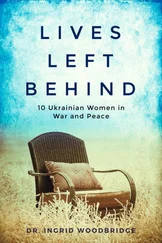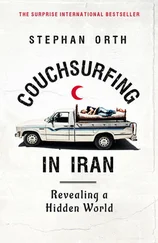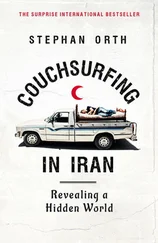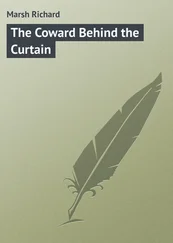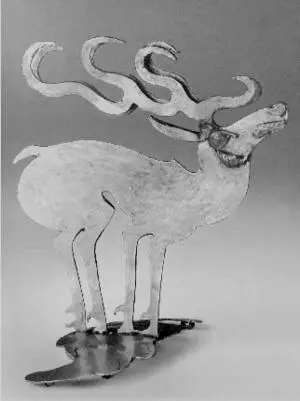
My phantomlike host doesn’t contact me (I do actually meet him once more, for one minute when I give him back the key before my departure). So I meet up with Ayu, someone I had also gotten in touch with before my arrival. We meet at 7:30 PM and it’s already dark.
Ayu is twenty-four, has long, dark hair, and is wearing a white blazer, a blouse with a floral pattern, and brand-new sneakers. She arrives with her mother, who is also very nice, but who leaves after five minutes. I conclude that I must not look like an ax murderer (too bad, actually, because if I did I would be able to scare the hell out of the local ultraviolent wrestlers. On the other hand, realistically, at this time of day they’re so drunk they wouldn’t know the difference anyway, and on top of that, the street we’re on is pretty dark).
I ask Ayu, who is a petite woman, how she has the courage to be out on the streets this late. “The only thing the drunks want from me is money for alcohol,” she says cheerfully. “I’ve never had a problem, even walking home at two in the morning.” She actually lives in Poznań, Poland, where she is studying Turkology, but returns home during the semester breaks to visit her family. She speaks fluent English, Polish, Russian, Mongolian, and Tuvan; she thinks quickly but walks slowly, speaks softly but sometimes with anger.
“We are victims of Russian propaganda that makes everything that happens in Tuva sound bad,” she rails. “If someone from Tuva commits murder they say, ‘Tuvan man commits murder.’ If a Russian commits murder in Tuva, then they say, ‘Murder in Tuva’ without naming the perp’s country. Sometimes they simply dig up old murder stories and circulate them again a couple of months later.” She makes the distinction customary in these parts of the country—“Russian” means the Slavs, and the minorities are called Chechens, Tuvans, or Yakuts, although, of course, on their passports they are equally Russian. “If I said that I come from Tuva and I have a knife in my pocket, people would immediately believe me,” says Ayu. “And if I said I own twenty reindeers, they’d believe that too. A lot of people’s perceptions have nothing to do with reality.” However, the times from which these impressions originate are not too long ago. Her grandma, whom she visited that afternoon, used to live as a nomad.
For a drunk’s next step, all four directions are equally mathematically probable. A dark figure fitting this description approaches us on the sidewalk. Ayu suggests crossing to the other side of the road. “Alcohol is a problem here; people become drunk more quickly for genetic reasons,” she says. The guy staggers away.
A B C
Russian Squat
A squatting position radiating nonchalance in which the upper arms rest on the knee while you gaze seriously into the distance. The body language is reminiscent of hip-hop record covers of the ’90s or shitting in the woods. Suitable paraphernalia includes track pants and bling. Early in 2016 there was a short trend of posting photos of the Russian squat on Facebook and Instagram, but after two weeks the fashion was over, which was one of the better pieces of news in 2016.
I ask her about the reasons behind the propaganda against her minority. “After the collapse of the Soviet Union we wanted independence, but Moscow didn’t approve,” she replies. The powers that be like to flex their muscles here. Like this afternoon. She wanted to attend a Buddhist lecture on altruism, but the Tibetan guest speaker was arrested shortly beforehand. Why he was arrested remains a mystery.
For our evening meal we go to a self-service canteen called Vostok, which is well hidden on the second floor above a supermarket and which I never would have discovered alone. The pelmeni , dumplings with sour cream, taste fantastic and cost virtually nothing. It’s always a pleasure to go with locals to their favorite places.
Back on the street we talk about Schopenhauer and Thomas Mann, about The Tin Drum and Wagner, about Berlin and Dresden. Ayu plans to take some German lessons soon, but she already seems to know more about the country’s culture than most Germans of her age.
“I have a couple of friends in Berlin. There, I like a lot that people who make an effort to become integrated are accepted. Russia, on the other hand, is pretty racist—especially in Saint Petersburg and Moscow.”
The street is gloomy, the asphalt uneven and full of cracks—there are often earthquakes here. There are no streetlights; the only light comes from a few windows. Every now and then a barking dog runs up to us; sometimes we come across men tottering in an uncoordinated manner. But no one bothers us, and eventually we say our goodbyes and catch cabs home. The drunken wrestlers must be elsewhere tonight.
OLKHON ISLAND
Population: 1,500
Federal District: Siberia

OLKHON SHOKOGUN
OLKHON ISLAND INLake Baikal is the destination I’ve been most eagerly looking forward to visiting. My private dacha owner, Yevgeni in Novosibirsk, went into rhapsodies about the hiking opportunities there, the photos of the region look stunning, and my host there, Sergei, appears to be particularly interesting—a former investment banker who gave up his job to build an Orthodox church in the village of Khuzhir, where he now rings the bell every day. He also invites large numbers of guests to stay without charge in his self-built wooden house. His story is so inspiring that there are articles about him in the international press. A friend who had been to Olkhon told me of his meeting with Sergei with a glint in his eye.
Unfortunately, one of the cast-iron laws of travel is that it’s precisely the place of which you have the highest expectations that has the greatest potential to disappoint. Like the Paris syndrome (in Japanese: Pari shōkōgun ), which describes a heavy depression that affects Asian travelers to France who expect the city of love to be oozing in romance, full of gorgeous women wearing Louis Vuitton dresses and humming Édith Piaf melodies from dawn till dusk, only to discover that it stinks of urine and tourist groups are not greeted with open arms.
The journey from Irkutsk takes six hours in a minibus, the interior of which is skillfully padded with foam so the roof and sides resemble a recording studio. Further clues to the driving style and the quality of the road are provided by the many cracks and small holes in the windshield and the multitude of saint figurines dangling below the rearview mirror.
A B C
@Sputnik_Not
A Twitter account that, with pitch-black humor, pokes fun at Russia, its propaganda, and at “Russia’s” American president, Donald Trump. It displays photos or short videos with titles like “Putin: Russia against censorship outside Russia,” “Russians are safe from invading NATO forces” (the photo shows vehicles stuck in deep mud), or “Putin: Russia is investing heavily in hi-tech products, e.g., cereals.” The platform has more than fourteen thousand followers, nearly a tenth of the number that follow the original Sputnik .
A small car ferry transports the bus across the deepest lake in the world; the water is a vibrant turquoise and the sky slightly cloudy. My first impression of Olkhon is that its greenish-yellow hills and happy cows remind me of the Shetland Islands. The good news is that the dirt road to Khuzhir is rough, but less rough than I expected. The bad news is that Sergei is not there. “He’s in France at the moment,” says a young man, who is presumably his son, as I arrive at the address Sergei had sent me when he confirmed my couchsurfing request. It’s great that he offers me accommodation in his absence, but a pity that I can’t meet him personally.
Читать дальше
![Stephan Orth Behind Putin's Curtain: Friendships and Misadventures Inside Russia [aka Couchsurfing in Russia] обложка книги](/books/415210/stephan-orth-behind-putin-s-curtain-friendships-a-cover.webp)




